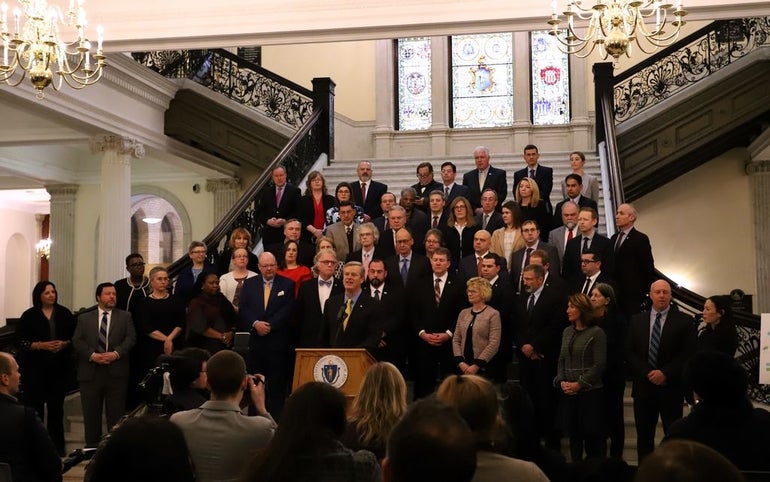Baker presses for more housing inventory to ease price crunch
 Photo/SHNS
Gov. Charlie Baker, at center, said a lack of housing inventory is making it harder for young people to buy a home and for workers to live close to their jobs.
Photo/SHNS
Gov. Charlie Baker, at center, said a lack of housing inventory is making it harder for young people to buy a home and for workers to live close to their jobs.
Gov. Charlie Baker doubled down Wednesday on legislation to make it easier for cities and towns to relax zoning restrictions to facilitate the construction of new housing, casting the problem of affordability and availability of housing as one central to the state's ability to address other vexing problems like transportation options and talent recruitment for jobs.
Baker, who proposed similar legislation last session but failed to secure a vote in either branch of the Legislature, said the housing problem has only gotten worse since he first proposed the concept in 2017.
The lack of inventory, Baker said, has made it harder for young people to buy a home and for workers to live close to their jobs, forcing more cars on the roads and longer commutes.
"We're making a big mistake with respect to the future that we all want if we don't step up and fix this," Baker said.
The bill the governor planned to file Wednesday closely mirrors legislation he filed in late 2017, but which never came up for a vote in the House or Senate despite a broad coalition of support. Some legislators and housing advocates at the time said they wanted to see a zoning reform bill go further, and include tenant protections and elements geared toward affordability, among other things.
"I would have preferred to have that pass, what the governor had done last year," House Speaker Robert DeLeo told the News Service on Wednesday. "I think that bill at least moved the ball forward in terms of resolving at least part of the issue in terms of housing."
Baker put the issue back on the table for the new two-year session Wednesday with an event surrounded by nearly 50 municipal leaders and advocates for employer groups, realtors and homebuilders.
"We're here today to fight for this common sense approach to help reach an ambitious but absolutely achievable and critical goal to the future of our commonwealth," Baker said.
Massachusetts Municipal Association Executive Director Geoff Beckwith said the governor's legislation, which is supported unanimously by the MMA's 35-member board, would make a "huge difference" for housing in the state.
"There are some who might try to hold out for more, but this legislation would represent the most significant zoning reform in Massachusetts in five decades. That is an important fact," Beckwith said.
After producing 30,000 new units a year for four decades, the governor said production in Massachusetts has fallen over the last 25 years to between 8,000 to 10,000 new homes.
The bill the governor is filing is identical, according to Housing and Economic Development Secretary Mike Kennealy, to the bill recommended last session from the Housing Committee.
The bill proposed to lower the threshold for certain zoning changes from two-thirds to a simple majority of the local governing body.
Kennealy said there are eight types of zoning changes that would qualify for the reduced approval threshold, including one recommended by the Housing Committee for certain multi-family or mixed-use projects with at least 10 percent affordable units in locations near transit or downtown areas.
Other reasons for the lowered threshold include approval of Smart Growth or Starter Home districts, increased density, allowing for the transfer of development rights and enacting natural resource protection zoning, or reducing parking requirements and dimensional requirements, such as minimum lot sizes.
There are now 69 qualified "Housing Choices" communities, including Worcester, Framingham, Marlborough, Natick and Grafton. So far, $6 million has been given out to 31 communities for housing development, and technical planning assistance from the state has been given to more than a dozen others.
Baker, after the event, said he wasn't discouraged by the bill's failure last session.
"One of the things we should all remember here is that this problem gets worse every year that goes by and we don't do something about it. To some extent, sometimes complicated stuff takes awhile and I've been involved in plenty of issues over the years where it took more than one trip through the branches to get something done," he told reporters.









0 Comments